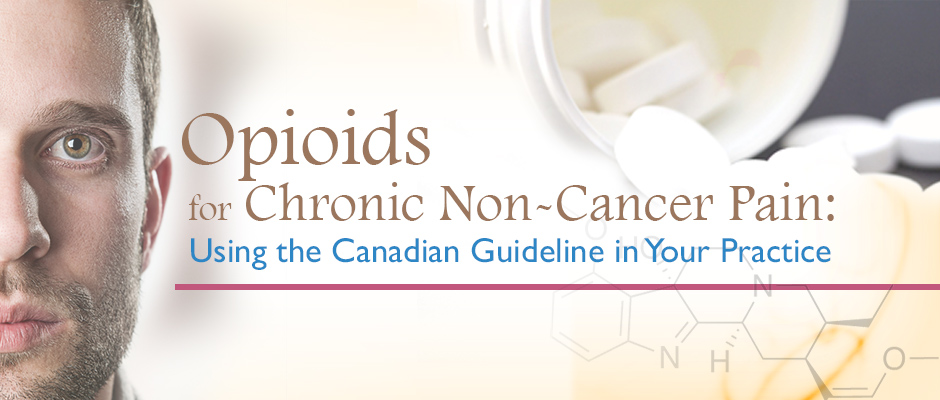Course Information
Opioids for Chronic Non-Cancer Pain: Using the Canadian Guideline in Your Practice

Canadian physicians and medical regulators continue to need guidance regarding opioid use for chronic non-cancer pain.
In 2010, the National Opioid Use Guideline Group offered recommendations for safe and effective use of opioids. Despite the implementation of the guidelines being associated with a decline in opioid use, critics characterized the recommendations as containing little direction about when not to prescribe or when to limit doses or duration of therapy.
The 2017 Canadian Guideline for Opioids for Chronic Non-Cancer Pain attempts to address these concerns by adhering to current best practices for systematic reviews and guideline development and incorporating evidence published since that used to inform the 2010 guideline. The 2017 guideline provides strong or weak recommendations when evidence is consistent, and best practice statements and expert guidance when evidence is conflicting or absent.
The recommendations in the 2017 Canadian Guideline will assist physicians and other health care providers to use opioids effectively and safely in patients with chronic non-cancer pain. The best practice and expert guidance statements will also help physicians inform patients about the potential benefits and risks of opioids, and enable other healthcare providers to be aware of roles they can play to achieve desired patient outcomes.
This module explores the 2017 Canadian Guideline for Opioids for Chronic Non-Cancer Pain through case presentations and summaries, and includes many useful tools to help manage, assess and monitor patients using opioid therapy for chronic non-cancer pain.
After completing this course, you will be able to:
- Identify patients with chronic non-cancer pain (CNCP) who may benefit from a trial of opioid therapy, as well as identify those who should not start a trial of opioid therapy.
- Discuss the decision process involved when considering a trial of opioid therapy.
- Describe the potential risks/harms associated with opioids and outline how to discuss these issues with the patient.
- Describe what a trial of opioid therapy involves.
- Cite examples of when opioids should be rotated, tapered or stopped.
- Identify resources available to help you and your patients manage their CNCP.
Funds in support of this CPD activity were provided as an educational grant to Memorial University and independently allocated and disbursed in accordance with current CMA guidelines. Funds in support of this program were provided by McMaster University through a grant from Health Canada.
Course Registration
You must have an MDcme.ca account and be logged in to register for this course
Credits
-
(up to) 2 credit hours
Expiry Date
This course expires on
Friday, November 9, 2018
Maintenance of Certification (Section 3)
This program is an Accredited Self-Assessment Program (Section 3) as defined by the Maintenance of Certification Program of The Royal College of Physicians and Surgeons of Canada, and approved by the Office of Professional and Educational Development (OPED), Faculty of Medicine, Memorial University. Remember to visit MAINPORT to record your learning and outcomes.
Mainpro+
This one-credit-per-hour Group-Learning program meets the certification criteria of the College of Family Physicians of Canada and has been certified by the Office of Professional & Educational Development, Faculty of Medicine, Memorial University for up to 2 Mainpro+ credits.

